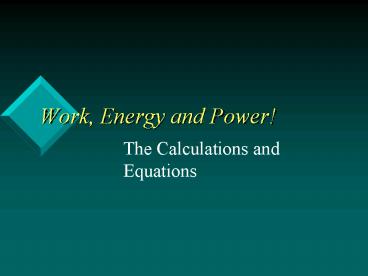Work, Energy and Power - PowerPoint PPT Presentation
1 / 14
Title:
Work, Energy and Power
Description:
British physicist James Joule is best known for his work in ... Potential is stored energy (Statics) Dependant on height. Kinetic is moving energy (Dynamics) ... – PowerPoint PPT presentation
Number of Views:603
Avg rating:3.0/5.0
Title: Work, Energy and Power
1
Work, Energy and Power!
The Calculations and Equations
2
James Joule
- British physicist James Joule is best known for
his work in electricity and thermodynamics
Together with the physicist William Thomson
(later Baron Kelvin), Joule found that the
temperature of a gas falls when it expands
without doing any work. This principle, which
became known as the Joule-Thomson effect,
underlies the operation of common refrigeration
and air conditioning systems. - The metric system unit of energy is the joule
(J), after James Joule.
3
Mechanical
- Mechanical energy is the energy which is
possessed by an object due to its motion or its
stored energy of position - Kinetic energy is the energy of motion
- Potential Energy an object can store energy as
the result of its position or elastic source
4
Work Concept
- Work is defined as a force acting upon an object
to cause a displacement - Mathematically, work can be expressed by the
following equation. - W F x d cos q ( cos 00 1)
- where F force, d displacement, and the angle
(theta) is defined as the angle between the force
and the displacement vector
5
Work Calculations
WF x d WF x d cos 300 W F x d
100N X 5m 100N X 5m X .87
15Kg(10m/s2) X 5m 500 N m 413 N
m 750 N m
6
Gravitational Potential Energy
- After an object has been lifted to a height, work
is done. - PE W F x d mah
Potential Energy is maximum at the maximum HEIGHT
7
Potential Energy Calculation
- How much potential energy is lost by a 5Kg object
to kinetic energy due a decrease in height of 4.5
m - PE mah
- PE (5Kg)(10 m/s2)(4.5 m)
- PE 225 Kg m2/s2
- PE 225 J
8
Kinetic Energy Calculation
- The energy of motion
- DKE W F x d mah1/2 mv2
- Find the kinetic energy of an 4 Kg object moving
at 5m/s. - KE 1/2 mv2
- KE ½ (4Kg)(5m/s) 2
- KE 50 Kg m 2 /s 2
- KE 50 J
9
Elastic potential energy
10
Spring constant Calculation
A tired squirrel (mass of 1 kg) does push-ups by
applying a force to elevate its center-of-mass by
5 cm. (A) Determine the number of push-ups which
a tired squirrel must do in order to do a mere
5.0 Joules of work. (B) Determine the squirrels
spring constant.
11
Spring Constant Calculation
- W F x d 10 N(.05m).5 N m
- W .5 J (each push up)
- 10 pushups 5 J
- PE ½ k x 2
- .5 J ½ k (.05m) 2
- .5 J ½ k (.003m 2)
- .5 J .0015 m 2
- 333.3 J/m 2 k
12
Power!
- Power is the rate that we use energy.
- Power Work or Energy / Time
- P W/t F x d/t F v
- The units for power
- J/s
- Kg m2 / s2 /s
- N m / s
13
Power Calculation
- A 5 Kg Cart is pushed by a 30 N force against
friction for a distance of 10m in 5 seconds.
Determine the Power needed to move the cart. - P F x d / t
- P 30 N (10 m) / 5 s
- P 60 N m /s
- P 60 watts
14
Summary
- Energy is the ability to move
- Potential is stored energy (Statics)
- Dependant on height
- Kinetic is moving energy (Dynamics)
- Dependant on velocity
- Springs store energy dependant on distance and
constant































